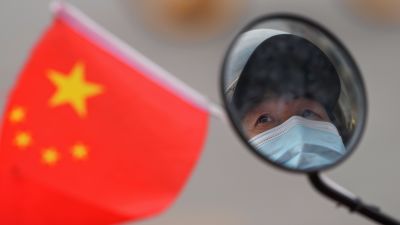China lockdowns: Guangzhou closes to nearly all arrivals as Covid cases grow

The Chinese government has closed off the major manufacturing hub of Guangzhou to most arrivals as it attempts to totally rid the nation of Covid amid spiking case numbers.
Just 27 cases have been reported in the city which boasts a population of around 18 million.
While no lockdown has been announced for Guangzhou, teaching in both primary and high schools has been switched to online after a number of local infections were detected.
Coronavirus numbers continue to surge in China's largest eastern cities, with Shanghai bearing the brunt of both the highest case numbers and the tightest restrictions.
The city recorded another 26,087 cases announced on Monday, only 914 of which showed symptoms.
Twenty-six million people in the city are currently living under a tight lockdown, with many residents confined to their homes for up to three weeks.
Mounting concerns have been voiced over the effect the lockdown will have on the economy in China's largest city.
It has been announced that only residents with a "definite need" to leave the city can do so, and only after they test negative for Covid within 48 hours of departure.
How is China dealing with Covid?
China has stuck to its “zero-COVID” strategy of handling outbreaks with strict isolation and mass testing, despite complaints in Shanghai over shortages of food and medical services.
China's government and state-controlled media have remained defensive about complaints over the Covid prevention measures.
After the US state department advised Americans to reconsider travelling to China, Foreign Ministry spokesperson Zhao Lijian said China was “strongly dissatisfied with and firmly opposed to the US side’s groundless accusation against China’s epidemic response.”
The English-language China Daily acknowledged that Shanghai's measures are “far from perfect," and pointed to the firing last week of three local officials for failing in their duties.
But it said that shouldn't become an “excuse to politicise the event and blame China.”
Mr Zhao issued a further defence of China's virus controls on Monday, saying they have “proven to be effective and in line with its national conditions and needs, and have made an important contribution to the global fight against the epidemic."
What is going on in Shanghai?
Shanghai has brought in thousands of additional health workers from other cities, provinces and the military.
Despite the large number of cases, no new deaths have been reported in the Shanghai wave, possibly because the omicron variant is less deadly than older variants.
City authorities also say they have secured daily supplies for residents, following complaints about deliveries of food and other necessities.
Residents have resorted to group buying of groceries because they are not allowed to leave their buildings, with only partial success in obtaining needed items.
Officials say they will begin relaxing restrictions beginning with areas where no new infections have been detected for two weeks.
Residents will be allowed to move around their districts while remaining socially distanced.
A second category will be allowed to move around their neighbourhoods, while others will remain isolated in their homes.
It is unclear how long the lockdown in Shanghai and other cities in China will last, but at this time, the restrictions appear to be doing little to stem growing case numbers.
The capital, Beijing, has seen relatively few restrictions, although the Erjiefang neighborhood including the famed 798 art district has been cordoned off and classified as high risk after eight infections were reported there over the past two weeks.
China is facing one of its worst local outbreaks since the pandemic began. The nation is still mostly closed to international travel, even as most of the world has sought ways to live with the virus.